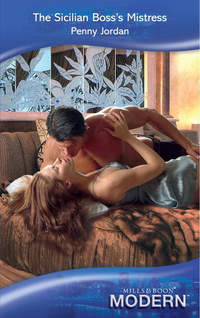
Полная версия
A Perfect Family


‘I can’t dance with you now, David,’ she told him huskily.
‘Of course you can,’ he replied, turning Jenny into his arms and beginning to move. ‘Mmm … you feel good.’ Helplessly Jenny realised that David wasn’t going to let her go and that it would cause less fuss to give in and dance with him than to go on protesting.
Unlike Jon, David had always been a good dancer, a natural dancer, and her face grew hot in the darkness of the subtly lit dance floor as she remembered what was said about men who were naturally good dancers. Too good, she decided shakily as he ignored her efforts to keep a respectable distance between them and pulled her closer to him.
‘What’s wrong?’ he whispered against her hair. ‘You used to enjoy dancing with me like this once.’ Jon was standing on the opposite side of the dance floor talking to Ruth. He didn’t appear to have seen them.
‘You look wonderful tonight,’ David told her softly, his hands sliding up to caress her back. ‘You look wonderful, you feel wonderful … you are wonderful, Jenny, and I wish to hell I’d never been stupid enough to let you go.’
PENNY JORDAN is one of Mills & Boon’s most popular authors. Sadly Penny died from cancer on 31st December 2011, aged sixty-five. She leaves an outstanding legacy, having sold over a hundred million books around the world. She wrote a total of a hundred and eighty-seven novels for Mills & Boon, including the phenomenally successful A Perfect Family, To Love, Honour & Betray, The Perfect Sinner and Power Play, which hit the Sunday Times and New York Times bestseller lists. Loved for her distinctive voice, her success was in part because she continually broke boundaries and evolved her writing to keep up with readers’ changing tastes. Publishers Weekly said about Jordan, ‘Women everywhere will find pieces of themselves in Jordan’s characters’ and this perhaps explains her enduring appeal.
Although Penny was born in Preston, Lancashire, and spent her childhood there, she moved to Cheshire as a teenager and continued to live there for the rest of her life. Following the death of her husband she moved to the small traditional Cheshire market town on which she based her much-loved Crighton books.
Penny was a member and supporter of the Romantic Novelists’ Association and the Romance Writers of America—two organisations dedicated to providing support for both published and yet-to-be published authors. Her significant contribution to women’s fiction was recognised in 2011, when the Romantic Novelists’ Association presented Penny with a Lifetime Achievement Award.
The Crightons
A Perfect Family
The Perfect Seduction
Perfect Marriage Material
Figgy Pudding
The Perfect Lover
The Perfect Sinner
The Perfect Father
A Perfect Night
Coming Home
Starting Over
A Perfect Family
Penny Jordan

www.millsandboon.co.uk
Table of Contents
Cover
Excerpt
About the Author
The Crightons
Title Page
Prologue
1
2
3
4
5
6
7
8
9
10
11
12
13
14
15
Copyright
Prologue
1917
It had been a cold, wet spring followed by an even wetter summer, and the crops lay flattened and battered beneath the relentlessly driving rain.
As Josiah Crighton wiped the condensation away from the railway carriage window to look outside he paused, turning instead to study the pale, set face of the girl seated beside him.
The girl … his wife, soon to be the mother of his child. His jaw tightened as he remembered his father’s fury when he learned what had happened.
‘For God’s sake, if you had to behave so … so stupidly, why the hell didn’t you do it outside your own backyard? Oxford … or the Inns of Court … surely you had ample opportunity there to—’
His father had broken off, drumming angrily on his desk whilst he surveyed him.
‘Well, there’s no help for it now. The girl will have to be found a suitable husband and as for you—’
‘She already has a husband,’ he had told his father quietly.
Just for a moment he saw that his father had misunderstood him, noting the relief expelling the impatient anger from his eyes as he exclaimed, ‘She’s married … then why the hell didn’t you say so …?’
His expression began changing as Josiah continued to look steadily at him and quietly explained, ‘We’re married, Father … Bethany and I …’
He had of course already anticipated the uproar that would follow his announcement and their mutual banishment from the lives of both their families. Hers had been no more pleased than his had been. Bethany was a yeoman farmer’s daughter who had been working up at the big house. He had bumped into her when he had gone there with some papers his father had instructed him to take to Lord Haver. They had recognised each other immediately from shared summer childhoods playing forbidden games on the muddy banks of the Dee.
One thing had led to another and the inevitable had happened. As soon as she had come to him with her news, ashen-faced and frightened, he had done what he had convinced himself was the only honourable thing he could do; never mind the fact that it was virtually an accepted thing within his family that one day he would cement the ties that kept the family together and, following its long-established tradition, marry his second cousin.
Bethany, too, had been destined for a family-arranged marriage to a distant relation, a widower with some well-stocked farmlands on the Welsh side of the city and two half-grown children in need of a mother’s care.
Refused the support of both families and the place that had been promised to him in the family firm of solicitors, Josiah had had no other course open to him but to find some alternative way of providing for his new wife and the child they were soon to have. And so he had taken a small set of rooms in the tiny market town of Haslewich, hoping that the business from the townspeople and the local rural community would be enough to sustain himself and his new family.
‘Do you really love me, Josiah?’ his new bride had asked him miserably, clinging tearfully to him on the day of their hurried and secret wedding.
He had held her tightly in his arms, unable to answer her honestly and unwilling to lie to her. The past and the comfortable security it had contained were now lost to him. The future stretched ahead as bleak and unwelcoming as the rain-lashed countryside. Turning his attention back to the scene beyond the railway carriage window, he tried not to contrast the life he had left to the one he was heading towards.
In Chester, his father’s secretary would just be bringing in afternoon tea. A fire would be burning warmly in the grate of his father’s panelled office. As the senior partner in Chester’s most prestigious firm of solicitors, his father was held very much in awe by those who worked for him and most especially Miss Berry, who guarded his privacy as jealously as any guard dog, even keeping a watchful eye on Josiah’s elder brothers who were also partners in the family firm.
The handsome silver teapot from which his father would take his afternoon tea had been a gift from a wealthy client, the china likewise, a particularly attractive and rare Sèvres teaset that had come to his father by way of a bequest.
In the bare spare rooms that were all Josiah could afford to rent and that must serve as his home as well as his place of business, he would be lucky if he managed the luxury of afternoon tea at all. There would certainly be no silver teapot from which to pour it and no Sèvres cup from which to drink it.
As he stared out of the window, his expression started to harden. The youngest of his father’s three sons, he had known even before his father had announced his rejection from the family that he was the least valuable of his father’s many assets. With his sons, Edward and William, already in the family business, a brother and a sister and countless numbers of nieces, nephews and other familial connections, his father could quite easily afford to dispense with one disobedient and disgraced son.
He would never treat his child, his own son, as his father had treated him, Josiah decided passionately, and he would, furthermore, ensure that his son would inherit a tradition every bit as proud and respected as the one that had been denied him. More so … much more so. As he glanced at the face of his now-sleeping wife, Josiah determined to found a dynasty that would one day rival that of his father and brothers. Rival it and outmatch it.
1969
As they drove north, the top down on the bright red sports car David Crighton had persuaded his father to buy him as a reward for obtaining his degree—not a first but at least he had passed—he turned his head to look at the girl in the passenger seat beside him, a feeling of fierce exultation running through him.
He had snatched her, virtually stolen her away, from under the nose of one of his friends, another member of the pop group that four of them had formed in their final year at college.
For a few months they had enjoyed a spell of dizzying success; a small fat man with a shiny bald head and even shinier suit, smoking a fat cigar, had come backstage after one of their gigs and offered to help them get a contract with one of the major recording studios.
It had been at a time when young unknowns were becoming overnight millionaires, their names whispered breathlessly and then screamed at in orgasmic frenzy by thousands of teenage girls throughout the land, and there had been no reason to doubt that the same thing could happen to them. Only the small fat man had turned out to be rather shrewder than they had realised, and whilst they had ridiculed his attempts to become one of them, he had been quietly skimming off most of their earnings.
All they had been left with were the remaindered copies of a record that had never made it out of the bottom fifty of the hit parade and a very large bill from the tax authorities.
His grandfather, Josiah, had paid off his share of it, angrily telling him that he was only doing so to save the family name from being disgraced. David hadn’t cared what had motivated him. Smiling genially at the older man in a marijuana-induced haze of goodwill, he had carelessly listened to the lecture he was being given and then as quickly as he could escaped back to London and his friends and the lifestyle he loved so much.
That had been over two years ago. Then he had laughed at his twin brother for wanting nothing more than to settle down in Cheshire and take his place in the family business. Now though …
Now though, things were different. He glanced again at the girl sleeping so peacefully beside him. They had been married at Caxton Hall three days ago. She had been wearing the tiniest minidress there had ever been, revealing yards of lovely, luscious legs, and smiling Bambi-eyed from between straight, glossy curtains of ash blonde hair. She was eighteen years old, just … and a model. The most sought-after, the most swingiest … the most wanted and lusted-after model there was on the London scene and now she was all his. She was also pregnant.
‘But how can I be?’ she had wailed in squeaky-voiced protest after the doctor had given them the results. ‘I’m on the pill….’
‘Obviously it doesn’t work when you go to bed with a man as sexy as me,’ David had told her, grinning.
She had refused to share his amusement, pouting sulkily at him as she reminded him of her modelling commitments.
And so here they were married and on their way to make a new life for themselves in Cheshire, and not just because Tiggy was pregnant. David frowned but there was no point in brooding on that other unfortunate matter. He had made a mistake and been found out, and as he had already defensively told his father, others did the same and got away with it. It wasn’t his fault that the senior partner in his set of chambers should be so ridiculously stuffy. After all, he had done nothing legally wrong.
* * *
1996
‘So tell me again about this family of yours and the birthday we’re going to help celebrate.’
Even now after six months together, the lazy, transatlantic drawl of Caspar Johnson’s voice still had almost as much power to stir her senses as his powerful six-foot-odd and very masculine body, Olivia acknowledged as she turned to smile at him.
‘Watch the road,’ Caspar warned her, adding softly, ‘and don’t look at me like that, otherwise …’
His openly and frequently expressed sexual desire for her was just one of the things that made him so different from any of the other men she had known, Olivia owned as she refocused her attention on the heavy north-flowing motorway traffic and answered his initial question.
‘Birthdays,’ she reminded him, adding, ‘and I’ve already told you umpteen times.’
‘I know,’ Caspar agreed, ‘but I like hearing it and I like even more watching your face when you talk about them. Just as well you decided against a career as a trial judge,’ he teased her. ‘Your expression, especially your eyes, would have given you away every time. They can be very revealing.’
Olivia Crighton grimaced but she knew he was right. They had met whilst she had been taking a postgraduate course in American law. Caspar had been her tutor and, like her, come from a legal background and also like her had chosen not to go into the family partnership but to make his own way in the world. Chosen … Caspar might have had a choice but she …
There were other reasons why the two of them made such a perfect couple, she told herself hastily, abandoning her earlier and far too dangerous train of thought—this was meant to be a happy family visit, not a means of resurrecting old problems—reasons that had nothing to do with their shared legal background, reasons of a very much more personal nature. Instinctively, as she dwelt on those reasons, her stomach muscles clenched, her toes curling into her shoes, her face flushing slightly as she mentally relived the previous evening’s blissful lovemaking.
It was just over two months now since she and Caspar had taken the decision to move in together and it had been a decision that neither of them regretted—far from it. She had not yet told her family about their plans for their shared future or her decision to go with Caspar when he returned to America and make her life there with him. Not that she expected them to have any objections; after all, as a female member of the family, she was easily expendable, neither wanted nor needed in the family partnership unlike its males. Their role was decided upon and planned for almost from the moment of their conception.
Caspar had been at first amused and then amazed at her family’s history, unable to believe that such an old-fashioned family still existed. Her upbringing and the whole of her family life was so different from his own. His parents had divorced when he was six, and Olivia had sensed that he was a man who was shy of emotional commitment, which had made his openly admitted desire for her all the more precious.
She knew that he loved her as she did him, but both of them had been hurt and bruised by their childhood experiences, and because of that, both of them were wary of the intensity of the emotions they shared. Both of them in their different ways feared love, Olivia suspected in her more introspective moments, but another thing she had learned young was the folly of questioning her feelings too deeply. Painful emotions, like painful cuts and bruises, were best left unprodded and not interfered with.
They had made no long-term plans for a shared future, Olivia recognised, other than that she would go to Philadelphia with Caspar when he returned to his home country. Insofar as her career plans went, it would definitely be a lateral move as she would have to requalify, but as she and Caspar had both agreed, the way they felt about one another was too important not to be given a chance. But a chance for what? A chance to develop into something permanent or a chance to die?
Olivia wasn’t sure which she actually wanted and neither, she suspected, was Caspar. Right now, the biggest commitment they could give one another was to say that they wanted to be together, that right now their relationship was of primary importance to both of them.
‘Your family …?’ Caspar prodded her from the passenger seat of her small, sturdy Ford—a twenty-first birthday present from her grandfather. She recalled that when Max, her cousin nearest in age to her, had turned twenty-one, Gramps had given him a sleek and dangerously fast sports car.
The family … Where should she start …? With her parents? Her grandparents? Or at the beginning with her great-grandfather, Josiah, who had initially founded the family business, breaking away from his own family in Chester to make a new life for himself and the bride his family had disdained.
‘How many of you exactly will there be attending this party?’ Caspar asked her, interrupting her train of thought.
‘It’s hard to say. It all depends on how many of the cousins and second cousins have been invited. The main family will be there, of course. Gramps, Mum and Dad, Uncle Jon and Aunt Jenny, Max, their son, and my great-aunt Ruth. Maybe some of the Chester lot.’
She glanced at the motorway sign by the side of the road. ‘Only another couple of exits now,’ she told him, ‘then we’ll be home.’
As she concentrated on the traffic, she didn’t notice his small frown as he heard her say the word ‘home.’ To him, home was wherever he happened to be living at the time. But to her …
She had come to mean a lot to him, this pretty, clever Englishwoman, who in some ways seemed so much younger than her American contemporaries and in others so much more mature. Unlike them, she seemed instinctively to put him first and that was very important to him—a legacy from all the years as a child when he had felt more like an unwanted parcel being passed from one parent to the other than a loved and wanted child.
Families—he was instinctively suspicious of them, but thankfully this visit would only be a short one and then he and Olivia would be leaving for America and their own life together—just the two of them.
1
‘Do you think the weather will stay fine? It will be awful if it doesn’t, everywhere muddy and wet, and with a marquee out in the rain.’
Jenny Crighton looked up from the guest list she had been checking to smile at her sister-in-law.
‘With any luck the weather should stay fine, Tiggy,’ she reassured her. ‘But even if it doesn’t, the marquee will be heated and—’
‘Yes, but people will have to walk across the lawn and—’
‘The marquee people are putting a walkway down from the house to the marquee. It will be covered and quite dry,’ she promised her patiently as though this had not been a subject they had discussed many times before.
It had come as no surprise to her to discover that although Tiggy had spent a good deal of time on the telephone talking about what hard work organising the joint fiftieth birthday celebration for their husbands had been, it was she, Jenny, who had been left to do the actual work. But then, that was their relationship all over, she acknowledged wryly. Tiggy had always been the glamorous one of the two of them whilst she was the more homey, hard-working one.
People made allowances for Tiggy and for her vulnerabilities; men were bedazzled by her even now when both of them were in their forties, and Tiggy, because she was Tiggy, could never quite resist her need to respond to their admiration and soak it up and feed on it. She meant no harm, of course. She adored David, everyone knew that, and he clearly worshipped her.
Jenny could still remember the look of pride and dazed awe in his eyes that summer he had brought Tiggy, his bride, back home and introduced her to them all. David—how everyone loved him—his father, the clients, his friends, the children, everyone, but no one so fiercely nor so determinedly as her own husband, Jonathon, his twin brother.
It had been Jonathon’s idea that they should have this double birthday celebration and combine it with a grand family reunion.
‘Dad would love it. You know how much the family means to him,’ he had told Jenny when they were discussing it.
‘He may well love it, but he will carp like mad about the cost,’ Jenny had warned him dryly, ‘and it will be expensive if we are to do it properly.’
‘Of course we are and Dad won’t mind … not if it’s for David.’
‘No,’ Jenny had agreed, but she had had to turn her face away so that Jonathon wouldn’t see her expression.
She knew, of course, why so much family emphasis was placed upon David; why her father-in-law was so determined that these twins of his should be so close, so supportive of one another, or rather that Jonathon should be so supportive of his brother.
Ben himself had been a twin but his brother had died at birth, and that loss had marked and scarred virtually the whole of his life.
Jonathon had been brought up knowing that in his father’s eyes he should consider himself most fortunate to have such a twin there in life beside him.
Only once had Jenny seen the fierce pride in Ben’s eyes turn to disappointment and that had been when David had left the set of chambers where he had been in training for the Bar, following a career pattern that had been laid out for him from the first moment of his birth.
‘Well, I hope you’re right about the weather,’ Tiggy was saying fretfully now. ‘My shoes still haven’t arrived, you know, and they promised that they would be here. It’s far too late to get another pair made and dyed and—’
‘They’ll be here. There’s still plenty of time,’ Jenny soothed her.
Tiggy had been a model in the sixties and she still had the same haunting, high-cheeked beauty she had possessed then, although the years of dieting and worrying about her weight had, in Jenny’s opinion, left her too thin. Her almost waiflike appearance, so appealing in a young, immature girl, somehow, to Jenny at least, seemed oddly jarring in a woman of forty-five.
Not that Jenny would ever voice such views. She was well aware of how others judged her and her relationship with Tiggy, and those, apart from her closest friends, could interpret it as envy, as those same critics judged Jonathon as being jealous of David.
Her normally mild brown eyes showed a brief flash of emotion before she controlled it and turned her attention back to the large area of lawn in front of them. It had taken quite a bit of diplomatic manoeuvring to get her father-in-law, Ben, to agree that the birthday festivities could be held here.
He had grumbled as Jenny had known he would about the cost and the inconvenience, but of course, when the time came he would rise to the occasion as the convivial patriarchal host, accepting the admiration and praise of their guests without a flicker of conscience.
There had been battles over each and every stage of the preparations for the weekend’s celebrations, which was no more and no less than Jenny had anticipated, but the irony of it was that Ben would be the first to complain if even the slightest detail fell short of his exacting standards—a fact that he was as well aware of as she was herself, Jenny acknowledged.







